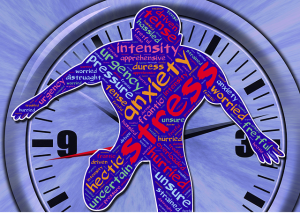 This page does not offer medical advice. See our medical disclaimer.
This page does not offer medical advice. See our medical disclaimer.
Breathing problems are a common symptom of anxiety and are often referred to as “anxiety-induced shortness of breath” or “anxiety-related breathing difficulties.” When a person experiences anxiety, their body’s natural “fight or flight” response is activated, which can lead to a number of physical symptoms, including changes in breathing patterns.
Anxiety can cause breathing problems through:
Hyperventilation
Anxiety can lead to rapid, shallow breathing or hyperventilation. This means you may be taking in more air than your body needs, which can result in feelings of breathlessness, dizziness, and tingling sensations in the extremities.
Muscle Tension
Anxiety can cause muscle tension, including in the muscles used for breathing. Tightened chest and neck muscles can make it feel difficult to take deep breaths, leading to a sensation of breathlessness.
Increased Heart Rate
Anxiety can also increase your heart rate, making you feel like you need to breathe faster to keep up with the increased blood flow. This can lead to a sensation of breathlessness or the feeling that you can’t catch your breath.
Panic attacks
In some cases, anxiety can escalate to a panic attack, during which a person may experience intense fear and physical symptoms like rapid breathing, chest tightness, and a feeling of suffocation.
It’s important to note that while anxiety can cause these breathing problems, it’s usually a temporary and reversible condition. Learning relaxation techniques, deep breathing exercises, and seeking professional help through therapy or medication can often help manage anxiety-related breathing difficulties. If you experience frequent or severe breathing problems due to anxiety, it’s advisable to consult a healthcare provider to determine the best course of treatment for your specific situation. Additionally, they can rule out other potential causes of breathing difficulties to ensure you receive appropriate care.
Vocal Cord Dysfunction
Anxiety-related breathing difficulties can sometimes be related to Vocal Cord Dysfunction (VCD), also known as paradoxical vocal fold movement disorder. VCD is a condition in which the vocal cords close together when they should be open during breathing, causing airflow obstruction and difficulty breathing. This condition can mimic the symptoms of asthma and often leads to shortness of breath, wheezing, and a feeling of tightness in the throat.
Anxiety can exacerbate VCD symptoms or even trigger VCD episodes in some individuals. When a person is anxious, they may unconsciously tense the muscles in their throat, including the muscles that control the vocal cords. This tension can lead to the vocal cords closing when they should be open, resulting in breathing difficulties.
It’s important to note that VCD can also occur independently of anxiety. Some people have VCD without any underlying anxiety disorder. Diagnosis and treatment typically involve a combination of techniques, such as speech therapy to retrain breathing patterns, relaxation exercises, and, in some cases, medications to manage underlying conditions or reduce anxiety.
If you suspect you have VCD or are experiencing persistent breathing difficulties, it’s essential to consult a healthcare professional for a proper evaluation and diagnosis. They can help determine the underlying causes of your symptoms and develop an appropriate treatment plan tailored to your specific needs.